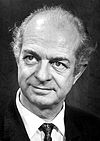Linus Carl Pauling (February 28, 1901 – August 19, 1994) was an American scientist, peace activist, author and educator. He is considered one of the most influential chemists of the 20th century and ranks among the most important scientists in history. Pauling was one of the first scientists to work in the fields of quantum chemistry, molecular biology and orthomolecular medicine. He is also a member of a small group of individuals who have been awarded more than one Nobel Prize, one of only two people to receive them in different fields (the other was Marie Curie) and the only person in that group to have been awarded each of his prizes without having to share it with another recipient.
Pauling was born and raised in Oregon. He attended Oregon Agricultural College and graduated in 1922 with a degree in chemical engineering. Pauling then went to the California Institute of Technology (Caltech), where he received his Ph. D in physical chemistry and mathematical physics in 1925. Two years later, he accepted a position at Caltech as an assistant professor in theoretical chemistry. In 1932, Pauling published a landmark paper, detailing his theory of orbital hybridization and analyzed the tetravalency of carbon. That year, he also established the concept of electronegativity and developed a scale that would help predict the nature of chemical bonding.
